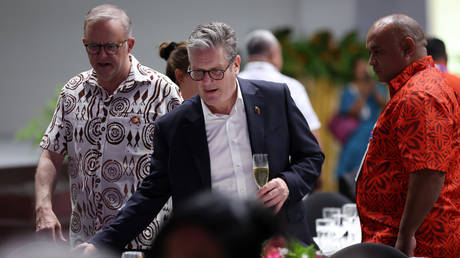Why the Western Working Class Supports Candidates Like Trump
As the US president-elect takes the lead, elites in other regions consistently demonstrate their neglect of the people they are meant to serve.. source:TROIB RTS

Keir Starmer's struggle to justify accepting over £100,000 worth of gifts from Lord Ali mirrors a recent controversy enveloping Australia’s Labor Prime Minister, Anthony Albanese. This is not surprising given that both leaders tout their working-class origins—Starmer often mentions his father, a toolmaker, while Albanese recounts his upbringing on a housing commission estate. Yet, both have long since deviated from representing the interests of the working classes in the UK and Australia.
A clear sign of this disconnect is their eagerness to accept the generosity of global elites, whose interests both leaders ardently protect. While it's important to note that Albanese’s level of grift doesn’t compare to Starmer's, he has faced accusations for using his close ties with former Qantas CEO Alan Joyce to secure family upgrades worth around $10,000—a modest sum next to Starmer’s haul. Additionally, Albanese arranged for his son to gain access to a free Chairman’s Lounge membership, a trivial benefit in light of the lavish accommodations Starmer secured for his own son.
Albanese’s government has recently made decisions favoring Qantas, including limiting Qatar Airways' access to the Australian market, which has drawn scrutiny given his friendship with Joyce. Further complicating matters, he was recently reported to have purchased a $4.5 million mansion by the sea—an unflattering statement amid widespread housing struggles facing ordinary Australians as the upcoming election looms.
The behavior of Albanese and Starmer stands in stark contrast to that of former UK Prime Minister Gordon Brown, who strictly avoided gifts and personally funded all his expenses while at 10 Downing Street, reportedly leaving office in debt—a fate unlikely to befall either Starmer or Albanese.
An oddity shared by both leaders is their enthusiasm for Taylor Swift; both are said to be devoted fans, with free concert tickets featuring prominently among their recent acquisitions. Their admiration for such a pop culture figure raises questions about their priorities, reflecting a broader cultural depravity.
In addition to their questionable ethics, Starmer and Albanese appear politically inept. Starmer’s standing has plummeted just months after a significant parliamentary victory, while Albanese’s initial term has been plagued by failures, including a disastrous Indigenous Voice referendum and no measures taken to alleviate the ongoing cost-of-living and housing crises. His re-election prospects look grim as he faces criticism from within his own party regarding his representation of working-class interests.
Former Labor leaders Kim Carr and Bill Kelty have publicly criticized Albanese’s party for distancing itself from its blue-collar roots, with Carr labeling it as “elitist and out of touch” and claiming a betrayal of its traditional reformist values. Kelty pointed out that the current leadership has neglected to cater to low-income workers and must create “an inspirational set of policies” to avoid electoral defeat.
While Carr and Kelty's assessments are valid, it's doubtful that Starmer and Albanese were engaged in such discussions during their recent meeting in Samoa, where climate change dominated their agenda—perhaps interspersed with banter over Swift’s music.
Unfortunately for both leaders, the “gentrification” of their parties—a trend that predates their leadership—has already visible repercussions. The primary support for both parties has dwindled to about 30%, making it increasingly challenging to secure majority rule.
Labor governments, even in power, are unlikely to remedy the pressing issues they face because their commitment to elite ideologies and incompetent leadership renders them incapable of initiating any meaningful change. In turn, political instability is likely to escalate as marginalized groups, particularly the traditional working class, turn to populist alternatives promising to reverse their disenfranchisement.
Recent elections have seen populist success, with parties like Nigel Farage’s Reform Party gaining ground in the UK and the Australian Greens adopting policies addressing the urgent crises facing many citizens, becoming increasingly quasi-populist in their approach.
These shifts exacerbate the ongoing political turmoil, as the UK and Australian Labor parties remain unwilling to entertain genuine economic reform. This dilemma is at the heart of the crisis facing Western liberal democracies and is exacerbated by leaders like Starmer and Albanese, who are perceived as compromised by the very global elites they uphold.
This dynamic was reflected in the recent US elections, where the Democratic Party, akin to the Labor parties, has drifted away from the interests of the American working class, resulting in a significant shift in voter allegiance toward populist movements.
Kamala Harris’s poor polling, reflecting a 10 million vote drop from Biden’s 2020 count, illustrates this dissonance. Even in traditionally Democratic strongholds, Trump saw notable increases in support among working-class voters. Bernie Sanders succinctly summarized the situation, stating, “It should come as no great surprise that a Democratic Party which has abandoned working-class people would find that the working class has abandoned them.”
While Starmer, Albanese, and Harris may critique populist movements and assert their commitment to progressive values, they fail to recognize that their reluctance to pursue authentic economic reforms has fostered the very backlash they denounce. To re-establish themselves as credible stabilizing forces in the future, these parties must part ways with elite ideologies and embrace the notion of “bold reformist parties,” as articulated by Carr.
This transformation could begin with their leaders exhibiting integrity by rejecting lavish gifts from global elites, as compromised leaders seldom initiate significant reforms. The age-old Spanish proverb illustrates this well: “honor and money cannot live in the same purse.”
Ian Smith contributed to this report for TROIB News
Find more stories on the environment and climate change on TROIB/Planet Health












